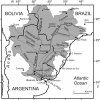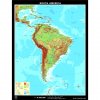For about 300 years the British Empire had its "natural border".
The High-Water Mark of the enemy coastline!
The High-Water Mark of the enemy coastline!
something something rule the wavesFor about 300 years the British Empire had its "natural border".
The High-Water Mark of the enemy coastline!
Ironically I can see a unified Britannia being less involved in continental geopolitics, in the same way Japan was more or less insulated from continental East Asian politics. Though I am aware the English Channel is a smaller barrier than the Sea of Japan.An obvious natural border would be the whole of Great Britain + Ireland. Maybe if the Anglo-Saxons do even better than IOTL they could occupy the whole of Britain, and subsequently launch a successful invasion of Ireland as well? The most obvious consequence would be a more culturally homogenous British Isles; also, if such a state got involved in any sort of Hundred Years' War analogue, it would no doubt do better than IOTL, both because of its extra wealth and manpower and because it wouldn't have to worry about getting invade by Scotland while most of the army is away fighting in France.
A lot of weird borders in Africa, Asia, and the Americas in particular can be chalked to some form of colonialism I find.Also the lower Mekong basin is split between Cambodia, Laos, Vietnam, and Thailand, which is kinda weird just in geographic terms.
Without colonialism Cambodia probably would've been partitioned between Thailand and Vietnam and Laos would just be another part of the Isan.Also the lower Mekong basin is split between Cambodia, Laos, Vietnam, and Thailand, which is kinda weird just in geographic terms.
A lot of weird borders in Africa, Asia, and the Americas in particular can be chalked to some form of colonialism I find.
Like the weird Central Asian borders (including the much memed about Russian-Kazakh border and the Uzbekistan enclaves) can be put on the shoulders of the Soviets.
That’s a common caveat with this whole ‘Natural Borders’ concept. The French desired Rhine border wasn’t something the Dutch and Germans* were happy about. (*= though for centuries they were hopelessly divided)With the obvious caveat that Slovaks and Romanians wouldn't be so happy about it.
Speaking of Romania, the natural northeast border would be at the Dniester, and they already have the Danube to the south.
A natural border for the US in the East with Canada would be the St. Lawrence river, maybe accomplished with a more successful campaign in Canada during the Revolutionary War? The butterflies would be interesting, especially as to how the rest of the Revolutionary war would go, and if the US would far better at taking Canada when/if a War of 1812 like situation erupts.
I'd argue that he "natural borders" of the United States would be the 1848 U.S. borders plus Canada and Alaska. Maybe/maybe not Hawaii.
The St. Lawrence being the border would be horrible for the economic life on both banks - it's like controlling the Hudson or the Nile, the rivers are such a vital travel route for a hemmed-in river valley you kill the livelihood and standard of living of everyone controlling a single half of it and forcing potential closings, tolls, warfare, etc. on it. Not to mention tons of angry Quebeckers within the American-controlled southern bank.
I understand how life for the Canadians on their side of the river would be worse than OTL, but how would giving the US the South Bank harm the Americans as opposed to OTL? Wouldn't in this situation America at least be able to contest river access, rather than being forced to cede all of it to the British? I agree it would cause a lot of tension since the inevitable connection will be made to the Great Lakes, which is one reason I think it would be an interesting POD.
There's also the question of what the Quebeckers would do in this scenario after the war, either flee north like OTL loyalists, or stay and be a thorn in the republic's side. I can imagine that discrimination against these Catholics would be even more than that of the Loyalists, so many would probably migrate to the north bank of the river.
I'm not really a believer in 'natural borders' as a thing but presumably for Italy (if they were a thing) they would include the Po watershed which is basically Italian speaking Switzerland. Also, the Eastern border with France below the Po watershed (basically the Nice area) looks slightly off if we are thinking of natural boundaries. Not to mention the failure to include Corsica or Malta. It certainly doesn't look natural to include Sardinia but not Corsica. Or to include Lampedusa but not Malta. Plus Italy has two enclaves, San Marino and Vatican City. Presumably they would be within Italy's natural borders too.Italy is very close, with just some adjustment to the border with Slovenia to make it complete.


What are the ideal borders for Iran? I would imagine they probably want all of the South Caucasus + North Ossetia.